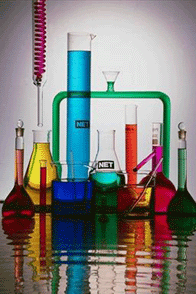6.27.2006
Fear of Chemistry
 Building the model rocket should be the hard part. Turns out, as we've seen, getting around government restrictions on ammonium perchlorate so you can actually launch your creation may present the bigger challenge.
Building the model rocket should be the hard part. Turns out, as we've seen, getting around government restrictions on ammonium perchlorate so you can actually launch your creation may present the bigger challenge.Rocket hobbyists are not alone in facing overzealous regulation of materials for use in amateur science. Go try and buy a chemistry kit like kids used in the 1950's. No such thing anymore.
In his article, Don't Try This At Home, Steve Silberman worries about dangerous ways the government's chemophobia puts not just crime and terror but amateur science on the run. (Wired, June 2006)
Silberman reports that concerns about terrorism and illegal drug production (particularly methamphetamine) have prompted the government to target things such as flasks, beakers and basic labware to chemical compounds used in fireworks. Ordinary items like liquid iodine, isopropyl alcohol, sulfuric acid, hydrogen peroxide and pH strips are not spared scrutiny and suspicion. Casualties include DIY experiments, home science, educational kits, labs and classrooms. Chemophobia has infected the Department of Homeland Security, DoD, DEA, EPA, Post Office, Consumer Product Safety Commission, as well as legislatures in more than 30 states.
Popular Science columnist Theodore Gray wonder: "Why is it that I can walk into Wal-Mart and buy boxes of bullets and black powder, but I can't buy potassium perchlorate to do science because it can also be used to make explosives?"
Of course, lawmakers, regulators and law enforcement folks know, without chemicals life itself would be impossible. And smart approaches to homeland security as well as good laws for catching and stopping the bad guys responsible for scourges like crystal meth, are key to our nation's well-being. But if pursuits like home chemistry and backyard rocketry become things of the past, how does this bode for our future?
As Rand Simberg has noted, "[i]n addition to being fun and educational, model rocketry is one of the paths that many took to becoming aerospace engineers."
Silberman quotes Shawn Carlson, a 1999 MacArthur fellow and founder of the Society for Amateur Scientists, who argues, "[t]o criminalize the necessary materials of discovery is one of the worst things you can do in a free society. The Mr. Coffee machine that every Texas legislator has near his desk has three violations of the law built into it: a filter funnel, a Pyrex beaker, and a heating element. The laws against meth should be the deterrent to making it -- not criminalizing activities that train young people to appreciate science."
Makes sense. After all, if future scientists find themselves discouraged from or punished for engaging in science experimentation, the criminals and terrorists have already won.
And really, what'll chemophobic regulators go after next, dihydrogen monoxide (aka hydrogen hydroxide)? Sheesh.






